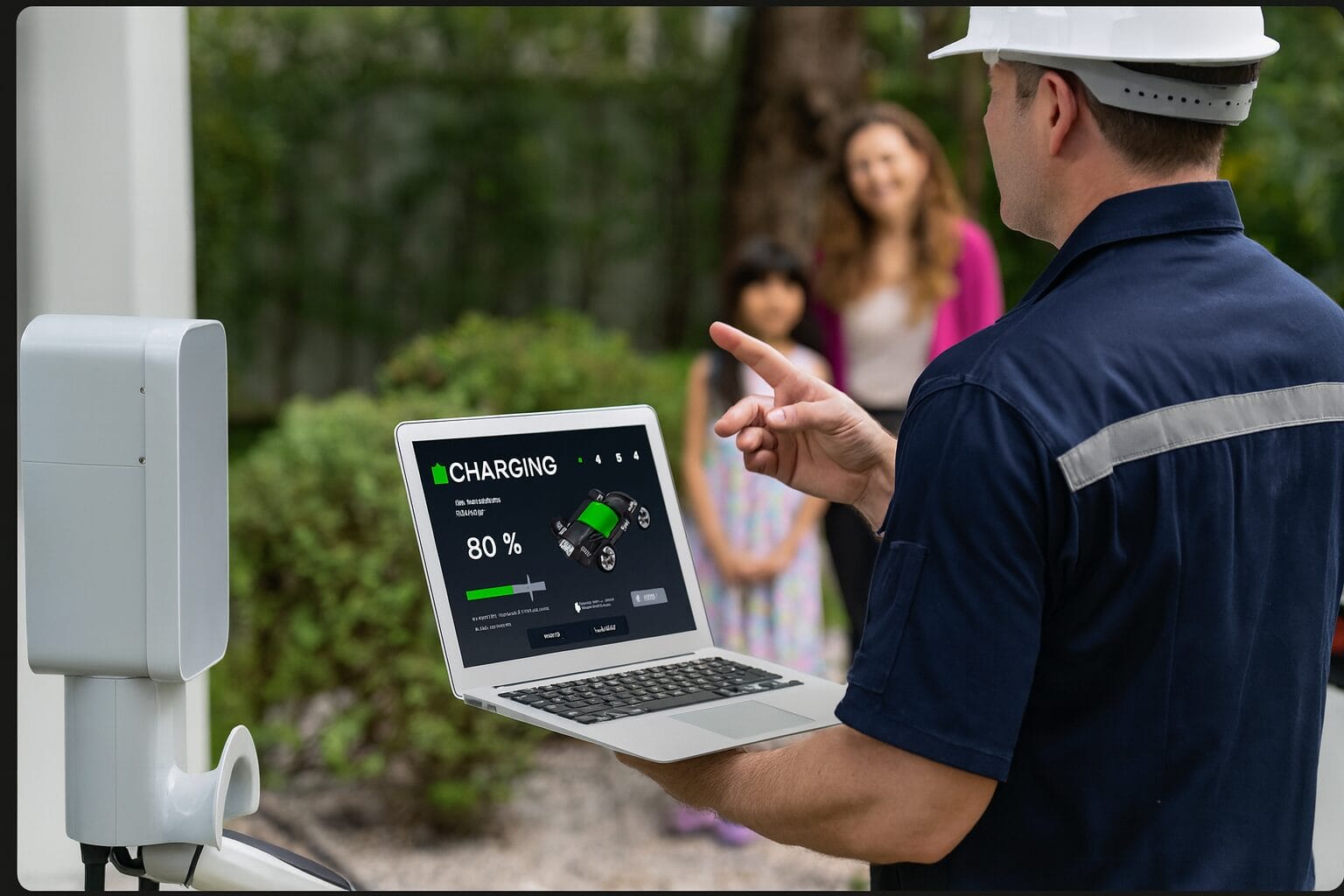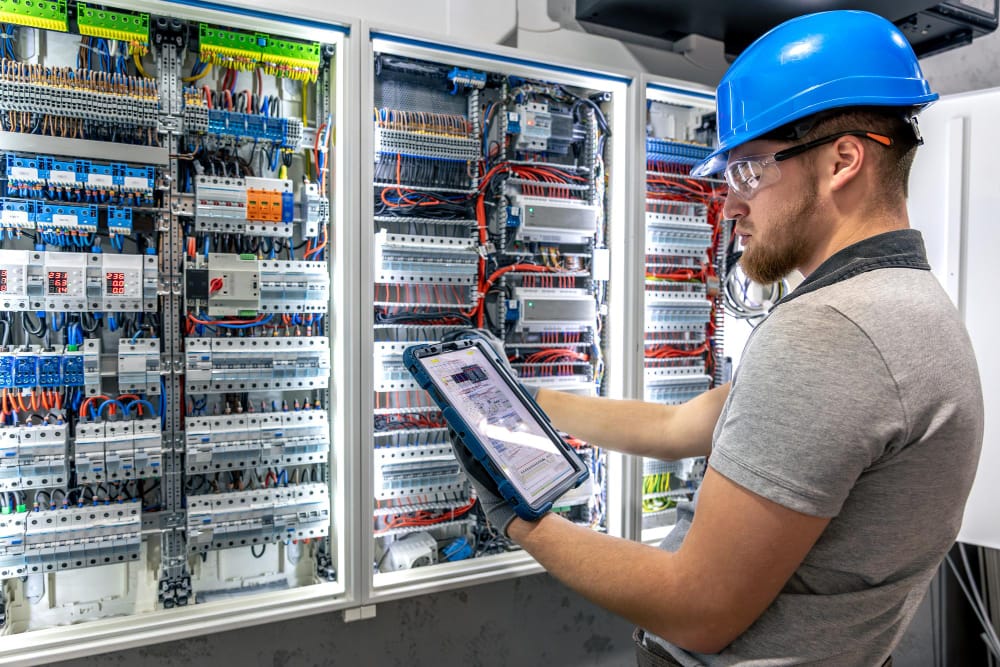Intelliarts delivers custom IoT solutions to help you implement, manage, and scale connected environments with ease.
Maintaining a fleet of vehicles is a tricky task for any business. An increased number of electric vehicles (EV) nowadays adds another layer of complexity to this matter.
Companies report an average reduction of 20-30% in total cost ownership (TCO) when switching to EVs. Besides, the EV fleet management market has grown at a compound annual growth rate (GAGR) of 15% over the past 5 years. As a consolidated observation, the EV fleet management approach is increasing in the business value it has to offer.
In this post, you’ll discover the concept and components of EV fleet management. Besides, you’ll explore critical electric fleet management considerations, as well as what telematics and IoT in EV applications can be used to track related metrics like energy consumption or battery condition. Finally, you’ll get to know the top 5 leading providers supporting electric fleet operations.
EV fleet management definition and challenges
Electric vehicle (EV) fleet management is the process of overseeing and optimizing the operation, charging, maintenance, and efficiency of a fleet of electric vehicles using specialized tools and technologies.
While not considered a fleet, one vehicle under management still requires optimization to operate effectively. Implemented on a large scale, fleet management brings substantial cost benefits.
You can discover what components EV fleet management comprises in the infographics below:
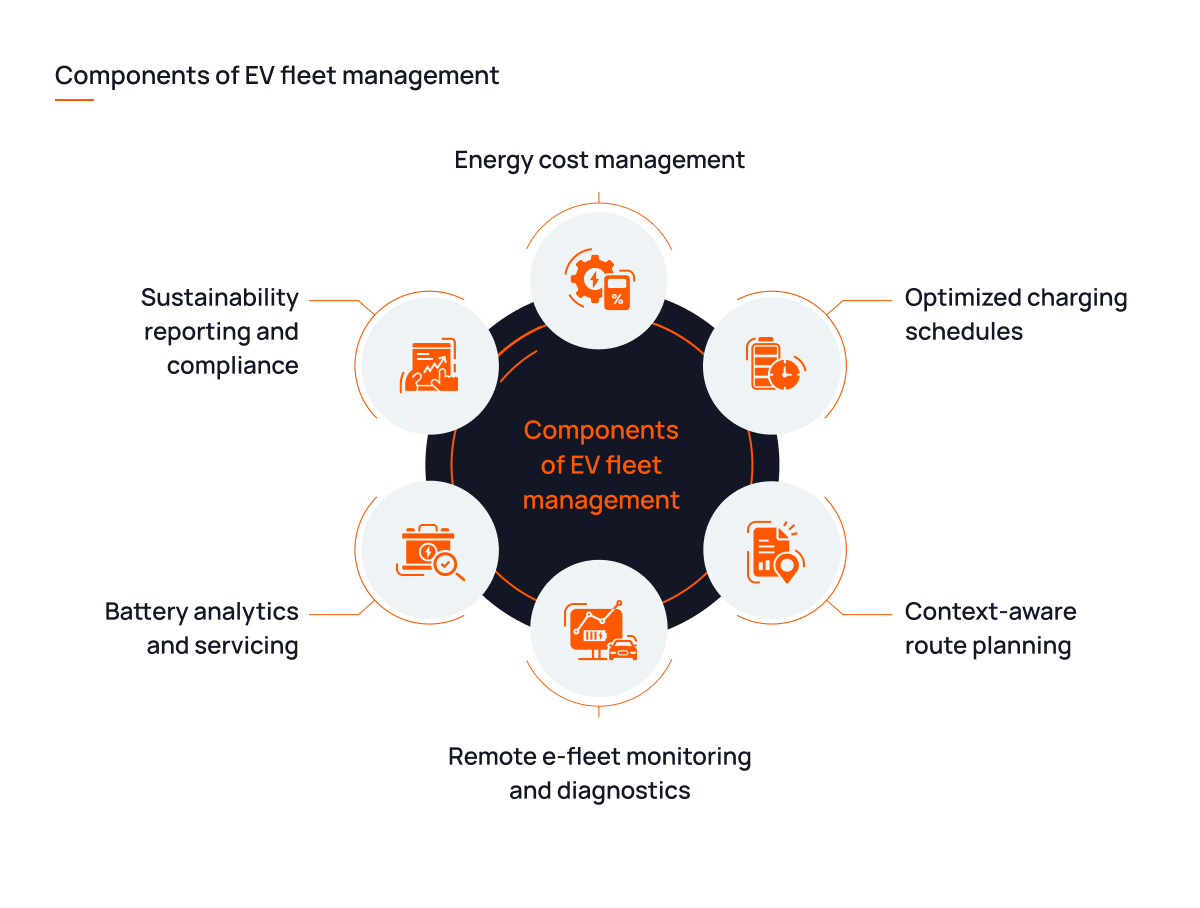
When it comes to managing electric vehicle fleets, there’s a range of high-level challenges that most businesses face:
- High operating and maintenance costs
- Lack of infrastructure
- Difficulty in integrating EVs into your business processes
- Regulatory compliance
- Poor performance of operators and drivers
Instead of listing specific technologies, we will provide key considerations and tips for optimized EV management in the next section. Upon implementation of these pieces of advice, you will have most, if not all, of the detailed challenges resolved automatically.
Key factors to consider to manage an EV fleet effectively
The Intelliarts team has substantial experience with implementing fleet management technologies and addressing nuances related to effective electric fleet management. From what we could observe in our projects, key factors to consider to manage an EV fleet optimally are:
#1 Charging infrastructure
The typical difficulty and the main restriction is the absence of publicly available charging stations. Since no business can afford to develop a complete net of charging stations on its own, you need to find a balance between utilizing public charging options and setting up your own ones where possible.
Pro tip: You may consider partnering with another company with an EV fleet. For example, you may agree on the mutual use of private charging stations in your energy network. Or you may rent another company’s charging stations.
#2 Energy management
Electric vehicles are known for overconsumption of energy at times. It is both deteriorating for their batteries’ health and cost-ineffective for your business. You may consider implementing physical and digital tools designed to support EV maintenance and energy efficiency.
Pro tip: The easiest way to ensure optimal energy consumption and track both EVs and chargers’ health is smart power technology. By analyzing charging reports with its help, you can spot anomalies and fix them swiftly.
You can discover extensive information on smart power software development by Intelliarts in our success story.
Here’s what reports provided by smart energy management setup may look like:
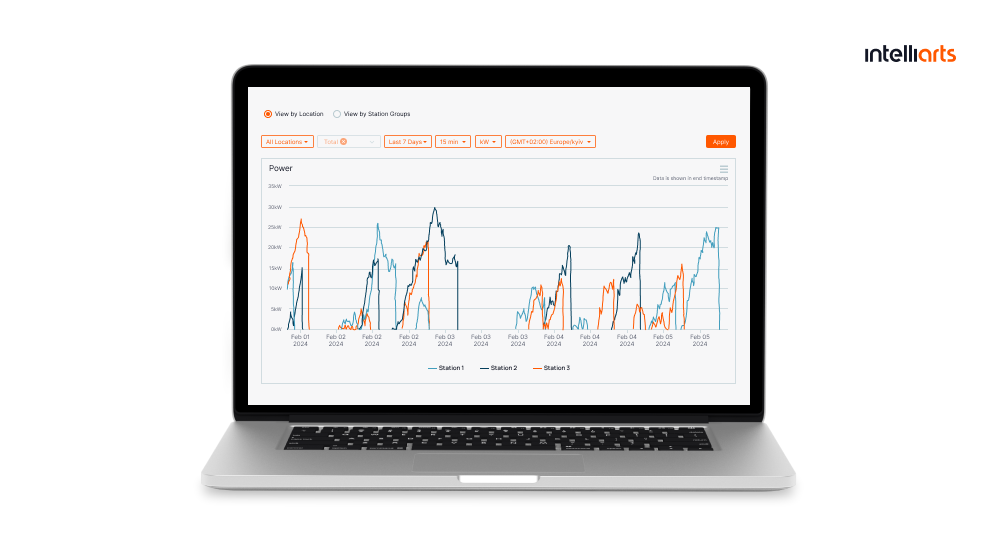
#3 Vehicle selection
Needless to mention, there’s a vast range of EV models available on the market. The very core of good EV fleet maintenance and management is a selection of optimal vehicles based on operational needs and travel distance requirements.
Pro tip: While the selection of vehicles is guided by many factors, we recommend paying attention to the total cost of ownership, maintenance costs, energy consumption, reliability of vehicles, and their battery lifespan.
#4 Maintenance and battery health
EV battery degrades by approximately 2.3% per year. Their estimated lifespan is about 8 to 12 years, so you need to catch the moment when it’s not energy-efficient to use your electric vehicles any longer. It’s especially the case when you have second hand vehicles in your fleet.
Pro tip: Regularly monitor vehicle and battery health, either through sensors or connected technologies, to prevent breakdowns. If it’s impossible, shorten the periodicity of scheduled maintenance procedures.
#5 Route planning
This consideration is among the primary ones. Based on the type of vehicle, cargo, distance to the destination, infrastructure, and other factors, your operators need to have all routes estimated. It prevents cases with a lack of battery energy or, in the opposite, with frequent fast charging.
Pro tip: You don’t actually need a team of operators to manually calculate the best routes. There are multiple tools on the market designed for route optimization. Most of them are totally suitable for electric fleet management. Just to mention a few, Onfleet, and RoadWarrior are among popular options. They can be used even by drivers themselves. However, if you have an extended fleet, you can hardly ensure effective management without operators at all.
#6 Telematics and data analytics
A considerable component of EV fleet management is tracking and analyzing the performance of vehicles and energy stations. For it, you need to install IoT sensors and specialized tools, gather data, extract reports, and then analyze historical information to detect any potential inefficiencies in order to fix them.
Pro tip: You don’t need lots of IoT sensors installed in your electronic vehicles and energy stations. Based on your business model and actual EV management needs, limit yourself to 2 to 4 sensors and, respectively, the types of reports that you gather and analyze. For example, as a transportation company or a regular business that provides employees with electric cars, you don’t need to track acceleration or braking patterns or tire pressure, as the latter is normally done by mechanics at a certain periodicity.
Types of telematics for choosing and data to be gathered are provided in the following section.
#7 Driver and operator training
Even with your infrastructure, vehicle, and digital tools in place, there’s still room for mistakes or inefficiencies. They are mostly attributed to the work of operators and drivers, who need to be well-familiarized with your new approach to EV vehicle management.
Pro tip: Consider conducting a series of training sessions for your employees. Ideally, your technology providers who supported your EV fleet and energy management setup should share knowledge of how to use the tools and best management practices.
#8 Technical issues
There’s one more problem. Rapid increase in charging EVs can cause load profile distortion, voltage deviation, harmonic injection, frequency imbalance, overloading, and a bunch of other technical issues.
Pro tip: While providers of energy infrastructure aim to reduce the probability of such issue occurrence, you, as a business, can also contribute to minimization of technical issues. As such, implementing smart charging technology optimizes key parameters, leading to reduced power loss, decreased voltage deviation, and a remarkable 96% decrease in the grid’s peak power.
To assist you, the Intelliarts team has prepared a checklist for maximizing range in your EV fleet. You may consider sharing it with drivers, car mechanics, and operators, so they can play their respective roles in ensuring the best conditions for driving.

You can also download the checklist for maximizing the range in your EV fleet in the PDF.
Tracking EV fleet performance
As mentioned previously, there’s a range of performance metrics to track using specialized tools and IoT sensors. Here’s a table encompassing all common approaches and providing the types of reports you can gather for further analysis:
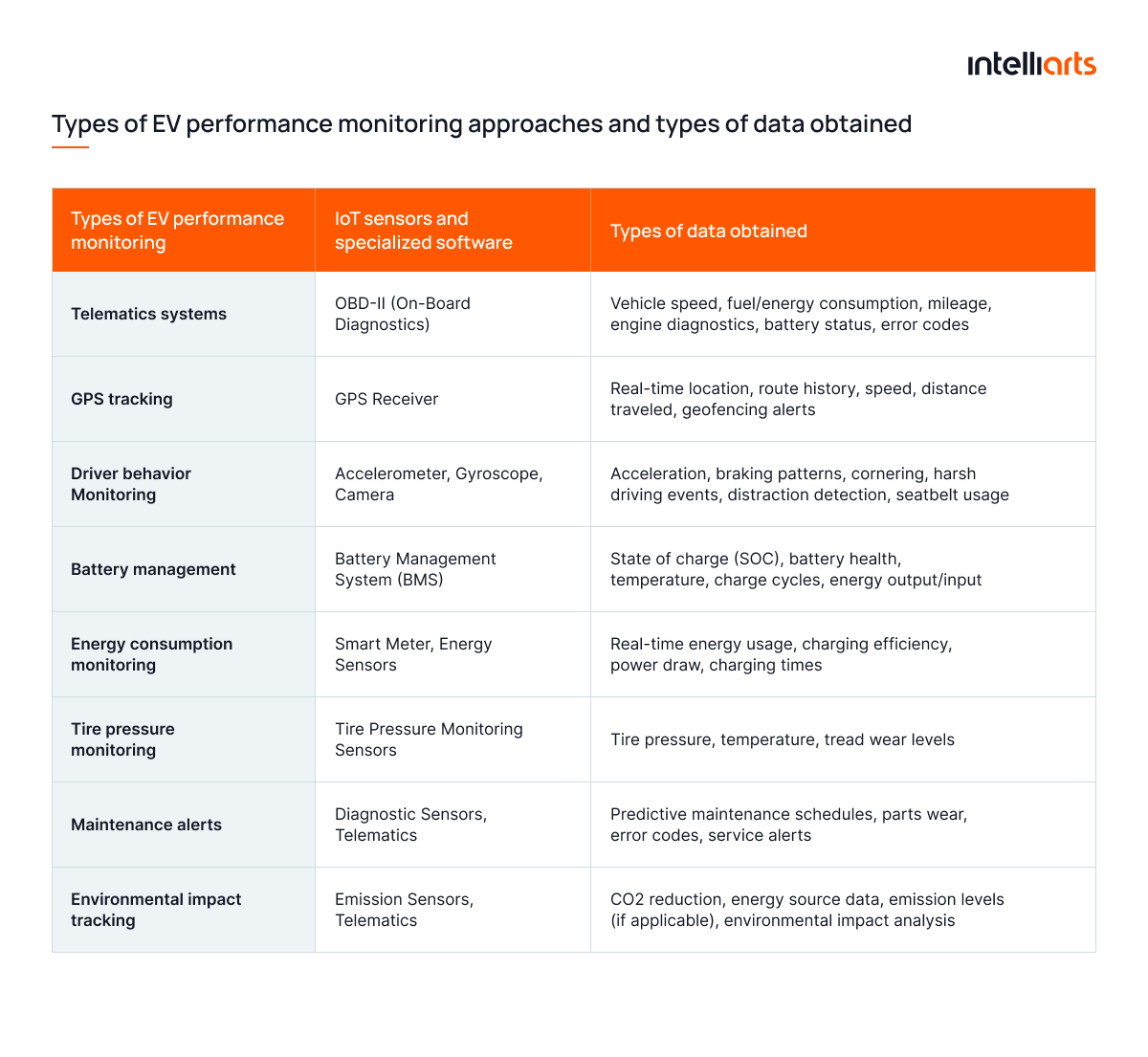
6 Leading EV fleet management companies
Now you’re probably wondering what the providers of electronic fleet management on the market are. Here’s our list of 5 leading providers of charging stations and electric fleet management systems:
#1 EV Connect
EV Connect is a leading provider of cloud-based technology for managing electric vehicle charging networks. Founded in 2009, the company specializes in helping businesses deploy, manage, and optimize EV charging infrastructure with a focus on scalability and reliability.
Key benefits:
- Comprehensive tools for EV charging station management
- Real-time monitoring and reporting capabilities for charging operations
- Scalable offerings tailored for large enterprises
- White label framework for the creation and launch of a driver mobile application and management portal
- Easy integration with existing energy management setup
- APIs for custom charging and EV fleet management functionality
- Comprehensive 24/7 support for clients and their drivers
#2 EVIQ
EVIQ is a Saudi-based electric vehicle infrastructure company that focuses on building a nationwide fast-charging network for electric vehicles (EVs) to support the Kingdom’s transition to sustainable transportation. A joint venture between the Public Investment Fund (PIF) and the Saudi Electricity Company (SEC), Eviq aims to accelerate EV adoption in Saudi Arabia.
Key benefits:
- A nationwide network of 5,000 EV chargers across 1,000 strategic locations is planned by 2030
- The first public DC fast-charging site launched in Riyadh, with high-power chargers providing over 100 kW per unit
- Collaboration with local partners for installation, maintenance, and support to enhance EV infrastructure
- Focus on providing reliable, accessible charging to drive consumer confidence in EV ownership
- Aligned with Saudi Arabia’s Vision 2030 for sustainability and economic diversification
#3 Samsara
Samsara offers advanced fleet management that integrates real-time GPS tracking, vehicle diagnostics, and driver behavior monitoring. Established in 2015, the company is known for its holistic approach to fleet management, including its strong support for electrification.
Key benefits:
- Real-time GPS tracking and vehicle diagnostics
- EV suitability assessments and route planning
- Automated workflows to enhance operational efficiency
- Comprehensive fuel and energy usage analytics
#4 Geotab
Founded in 2000, Geotab is a global leader in fleet management and telematics, providing robust capabilities for both electric and traditional vehicle fleets. Their tool is known for its scalability, making it suitable for businesses of all sizes.
Key benefits:
- GPS tracking and driver behavior monitoring
- Vehicle diagnostics and predictive maintenance
- Support for emissions tracking and decarbonization efforts
- Integration with a wide range of EV models
#5 ChargePoint ViriCiti
ChargePoint’s ViriCiti is a specialized fleet management tool focused on maximizing the efficiency and uptime of electric vehicles. ChargePoint, founded in 2007, has become one of the largest networks of independently owned EV charging stations, and its ViriCiti technology is an integral part of its comprehensive EV management suite.
Key benefits:
- Advanced reporting and real-time fleet insights
- Optimized charging schedules to reduce costs
- Vehicle and station management for improved uptime
- Enhanced battery health monitoring to extend vehicle life
#6 Verizon Connect
Verizon Connect, a division of Verizon Communications, offers comprehensive fleet management that leverages GPS tracking, telematics, and driver behavior monitoring. With its roots in telecommunications, Verizon Connect provides robust and reliable capabilities for managing both traditional and electric vehicle fleets.
Key benefits:
- Real-time GPS tracking and fleet monitoring
- Charging station location mapping and schedule management
- Integrated video and dashcam features for enhanced driver safety
- Scalable offerings suitable for various industries including transportation, logistics, and construction
How Intelliarts can be helpful in your EV fleet management
While the EV fleet management companies listed above can provide branded technologies, they still need to be integrated into your digital infrastructure. Alternatively, you may need smart power management, vehicle tracking, or a fully tailored setup developed from scratch. That’s why, oftentimes, you need consulting and dev assistance from trusted development partners like Intelliarts.
Here are two of our many success stories related to energy and EV fleet management:
Enabling smart, next-gen EV fleet operations

Challenge: The customer reached out to Intelliarts with a request to build a custom tool for managing electric vehicle fleets. This enterprise-level tool was intended to help operators keep track of fleets and plan charging effectively.
Solution: We delivered the requested software that helps to ensure better fleet control and efficient charging. With this app, we provided means to optimize energy consumption and lower costs for EV fleets. We added features like EV charging status, EV charging data analytics and prediction, at-home charging options, and more.
Outcomes: With our fleet management, the customer achieved greater operational efficiency and cost optimization. Besides, we managed to ensure the best charging flexibility possible.
Smart power management for energy consumption optimization
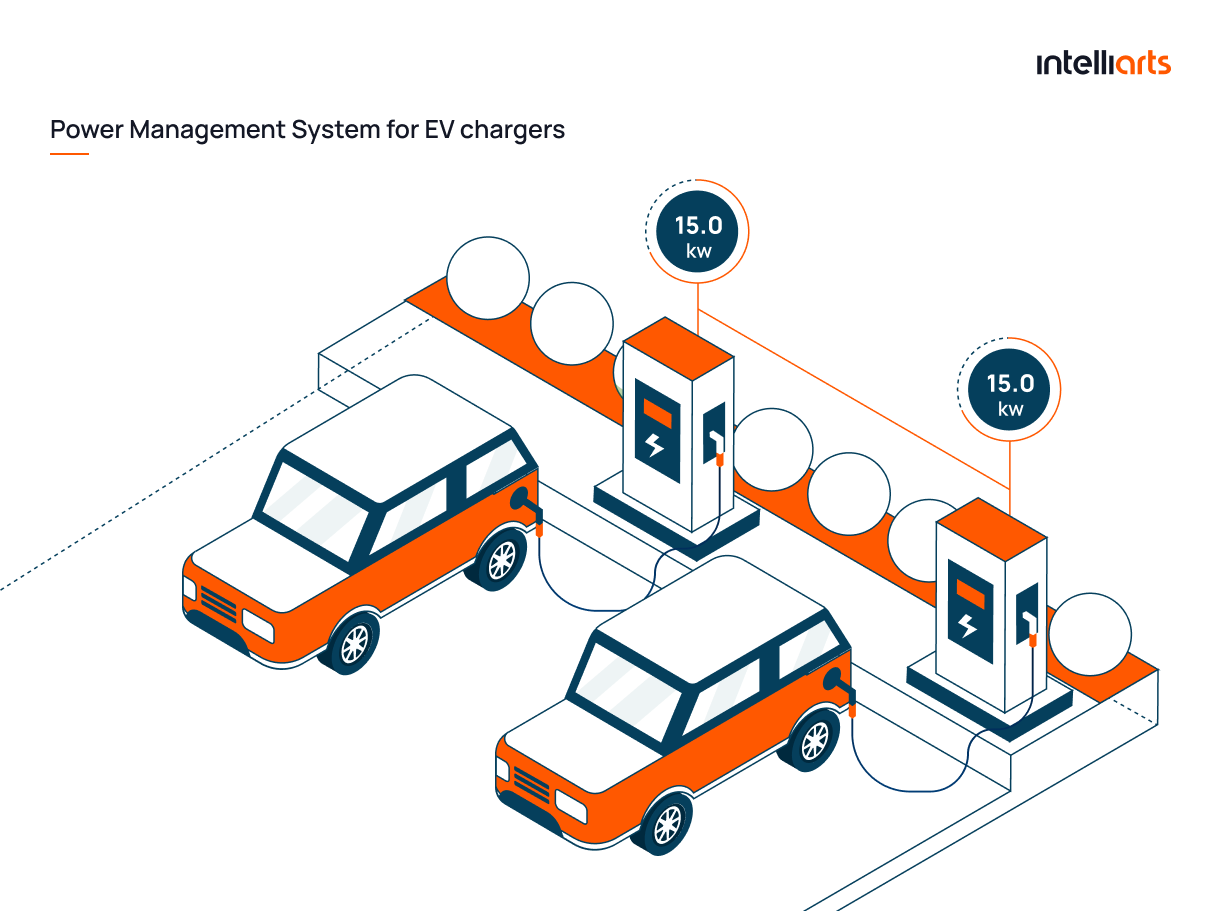
Challenge: In this project, we were requested to help ensure that end users obtain more value from using our customer’s charging site goals. The goal was to optimize energy consumption, mitigate the effects of climate change, and maximize the cost-efficiency of stations.
Solution: The Intelliarts team built a power management setup that allows for scheduling power limits for any time period for one or more stations. The algorithms utilized made it possible to automatically shift the charging load based on the dynamic electricity grid and renewable supplies. We included data analytics features as well as off-peak charging and random delay capabilities.
Outcomes: With our energy management system, Intelliarts’ customers now enjoy optimized use of energy, greater cost-efficiency, longer lifetime of their electrical infrastructure, and higher quality service.
Streamlined service verification setup for a vehicle service provider
Challenge:
Intelliarts’ customer, who is a leading vehicle service provider, faced a significant challenge with their service verification process. After a mechanic completed a service, a quality team had to manually check whether the service was performed correctly based on certain tabular data and the mechanic’s comments. This resulted in delays in billing customers, as the quality team had to validate every service before approval.
Solution:
To address this, we developed an innovative system that ranks services based on the likelihood of errors. Our solution leverages data analytics to prioritize services from most to least probable for mistakes. This approach enables the customer to immediately bill customers for services falling below a certain error threshold while allowing the quality team to concentrate their efforts on verifying potentially faulty services.
Outcomes:
With our service verification, our customer has significantly reduced the time spent on billing processes and enhanced operational efficiency. The quality team now focuses on services that require attention, leading to faster service turnaround and increased customer satisfaction.
Final take
As it can be concluded, effective EV fleet management is crucial for businesses looking to optimize their electric vehicle operations and reduce associated costs. By focusing on key factors such as charging infrastructure, energy management, vehicle selection, maintenance, route planning, telematics, and driver training, companies can overcome common challenges and ensure the sustainability and efficiency of their EV fleets.
Implementation of EV fleet management requires substantial niche-specific expertise and experience. Should you need assistance, consider Intelliarts as your trusted tech partner. With over 24 years of experience in the market and dozens of renewable energy and EV-related projects under our belt, we are ready, willing, and able to address your business needs.
FAQ
1. What is the future of EV fleet management?
The future of electric vehicle fleet management lies in advanced analytics, AI-driven predictive maintenance, and seamless integration with smart grids, ensuring optimized operations, reduced costs, and enhanced sustainability for electric fleet management.
2. How can your EV fleet management solutions help reduce our operational costs?
Our electric vehicle fleet solutions help reduce operational costs through optimized route planning, energy-efficient charging, and predictive maintenance, ensuring cost-effective electric car fleet management.
3. What specific features does your software offer for real-time tracking and battery management?
Through expert emobility software development, we create custom solutions that offer real-time, battery health monitoring, and energy usage analytics—all key for effective electric vehicle management. These features ensure your fleet operates at peak efficiency, minimizing downtime and maximizing performance.
See all questions
Structure






